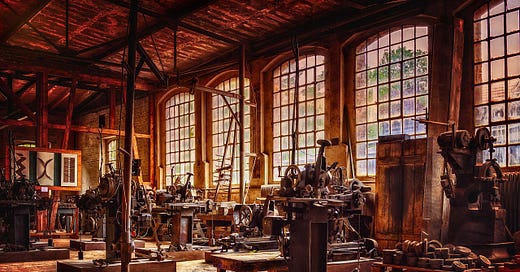Fountainhead Armory 4-4.
The Beacon of Long Days. The Spire of Malice. The Lead Citadel. The Shithole. The factory was all of these things. The 4-4 structure and its sprawling campus stood as a monument to Fountainhead’s dominance in Vargos. Weapons, drones, ammunition, and experimental killing machines rolled off its assembly lines around the clock. Its efficiency and market dominance was indisputable as the second-largest munitions factory in Tokyo produced only a sixteenth of Fountainhead’s output, and that was only when its workers and machines were overclocked. The air around it hummed with the rhythmic clanging of assembly lines and the endless whir of conveyor belts stretching in every direction, so vast it would take a day of careful observation to determine where just one of them truly ended.
The massive structure and its surrounding campus covered hundreds of city blocks and housed over 15,000 employees. Most of them were born, worked, slept, lived, and died within its walls, many never even glimpsing the rest of the city. Spaz Costa, child of Hernan and Flower Costa, son of Fountainhead Armory 4-4 and the Local 57 Bullet Makers Union, was one of those people. His mother had gone into labor on the factory line, and by the time he turned six, he was already working beside his father a full year before the minimum age-in requirement. His parents loved him deeply from the moment they first laid eyes on him, often taking on heavier workloads to ensure he could clock out early to run and burn off his energy. That earned him his name—“Spaz,” a customary gift from the factory to its children.
A real bullet maker, Spaz grew up rebellious, unafraid of defying the supervisor corps. Many nights he spent in the vent room, assaulted by the hot exhaust the factory produced. Once, he required the help of a union cyberdoc after losing his hearing in one ear and burning his skin raw. He received a cochlear implant, a patch of synthskin, and a new cybernetic hand. The relief was brief. The union never hesitated to collect on debts, and Spaz had two years to pay off the procedure.
The debt was crushing, and as a troublesome worker, he knew overtime opportunities would be closed to him for at least a decade until new supervisors rotated in. That was how he found the Dreg Trade: illegal cybernetics and firearms. It was common enough for factory workers, many of whom made money as vultures, but merely suggesting the work incited rage in his father.
“I’d sooner die than have a vulture for a son,” Hernan had spat, his face twisted with disgust. The tirade that followed was worse. Hernan was the fourth generation of factory sons in his family, and with Spaz being the fifth, he couldn’t stomach the thought of his heir tarnishing the Costa name. Vultures were insubordinates, troublemakers who made life harder for the workers who followed the rules. And the Costas had always been good workers. Flower never gave her blessing, but from that night on, she always left assorted materials from the factory line in plain view, just in case a Dreg trader happened to pick them up outside their residential cell.
Spaz took to the work quickly, with gusto. He made a name for himself among the other vultures, who, instead of scamming him or cutting him out, mentored him in the art of crafting junk weapons from scraps, conning substitute guards out of obscure materials they believed to be trash, and making powerful contacts outside the Iron Reach willing to buy in bulk. They claimed they saw themselves in him, but Spaz knew better. These men knew his father. His father had bled for the union, fought for his brothers and sisters on the factory floor. Even the vultures respected the Costa name. And for the first time in his life, Spaz felt like a man.
Like many vultures, Spaz’s career ended at the wrong end of a product test. He had found a discarded cybernetic hand at the bottom of a waste bin on one of the factory’s subfloors during his shift. The brand was Robins Co. whose products were praised for affordability, but ridiculed for poor craftsmanship. It would be worth enough to pay off his union debt, upgrade his parents’ residential cell, and even get himself a cheap cell of his own. He removed his own cybernetic hand and installed the Robins Co. piece with ease. Then, as he updated the software, his vision turned cloudy. He tried to shake it off, but before his sight returned, a work truck flatlined him as he stepped toward the main floor. He died instantly.
Hernan and Flower didn’t leave their cell for a week after it happened. When the supervisors came and beat them, demanding they return to the line, Hernan begged them to end his life, to take away the pain, the hole in his heart left by losing his only son. The supervisors left them bruised, and as Hernan lay broken in his cot, a crowd gathered outside their cell.
Hernan recognized some of them. Others, he did not. But each held a blinking credit chit, the green lights indicating full storage files. One by one, they stepped into the room, placing the chits before Hernan and Flower. The last to enter was an old woman Hernan recognized—an old friend of his father’s. She set hers down and met his gaze. The credit chits came from all over the city, marked by the unmistakable signs of the Dreg Trade, their presence within the Iron Reach an unspoken truth.
“We are all children of Fountainhead Armory 4-4,” the old woman croaked. “Your loss is a loss for us all.”
Then, without hesitation, Hernan and Flower surged forward, embracing her, sobbing into her shoulders as the others stood outside, silent in their grief.




